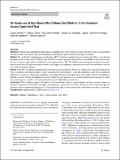At-Home use of App-Based Mindfulness for Children: A Randomized Active-Controlled Trial
Author(s)
Treves, Isaac N.; Olson, Halie A.; Ozernov-Palchik, Ola; Li, Cindy E.; Wang, Kimberly L.; Arechiga, Xochitl M.; Goldberg, Simon B.; Gabrieli, John D. E.; ... Show more Show less
Download12671_2023_Article_2231.pdf (1.291Mb)
Publisher with Creative Commons License
Publisher with Creative Commons License
Creative Commons Attribution
Terms of use
Metadata
Show full item recordAbstract
Abstract
Objectives
School-based mindfulness interventions in children have shown benefits to child well-being. Here, we investigated the effectiveness of a remote, app-based mindfulness intervention for promoting well-being in children.
Method
We conducted a randomized controlled trial (RCT) with two control groups to examine the effects of an 8-week mindfulness intervention in U.S. children ages 8–10. We compared pre-post effects between a mindfulness intervention using the Inner Explorer app, and two audiobook control interventions. The 279 children who participated in the interventions were assessed on self-report measures of anxiety and depression symptoms, perceived stress and trait mindfulness and we also collected parental reports.
Results
Over 80% of children completed the intervention in each condition. There was evidence for reduced self-perceived stress in children and reduced negative affect in children by parental reports using the mindfulness app, but no significant reduction for anxiety or depression symptoms. In general, between-group effect sizes were small (d < 0.45). Regular use, defined as at least 30 days of mindfulness practice within the study period, was associated with reduced child negative affect by parental reports, as well as reduced parental stress and child self-perceived stress.
Conclusions
These findings suggest that home use of a mindfulness app in young children can have a positive impact on children’s emotional well-being if the app is used regularly, specifically for at least 30 days in the 8-week study period. Strategies aimed at promoting regular use of the mindfulness app at home could lead to even better outcomes for children.
Preregistration
Preregistered on OSF at
https://osf.io/23vax
Date issued
2023-10-09Department
Massachusetts Institute of Technology. Department of Brain and Cognitive Sciences; McGovern Institute for Brain Research at MITPublisher
Springer US
Citation
Treves, Isaac N., Olson, Halie A., Ozernov-Palchik, Ola, Li, Cindy E., Wang, Kimberly L. et al. 2023. "At-Home use of App-Based Mindfulness for Children: A Randomized Active-Controlled Trial."
Version: Final published version